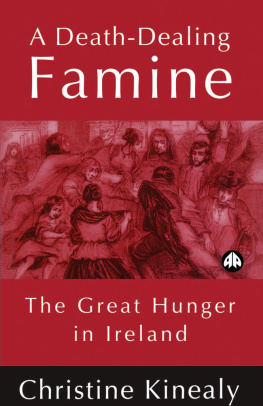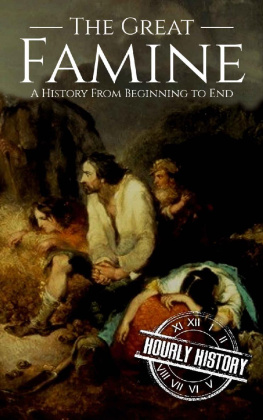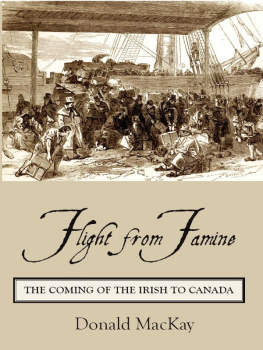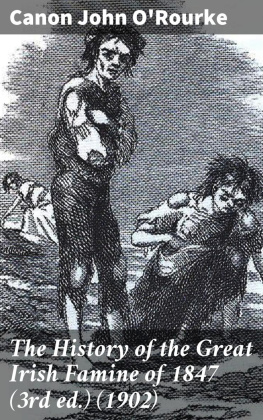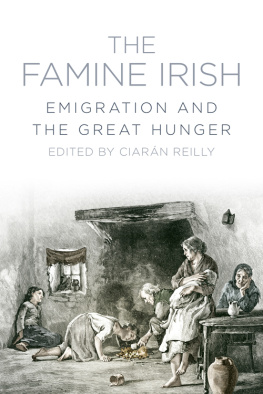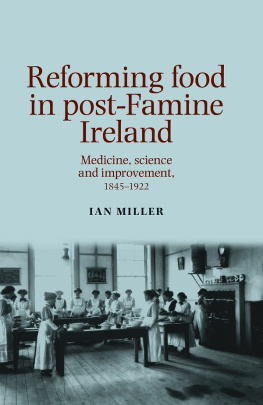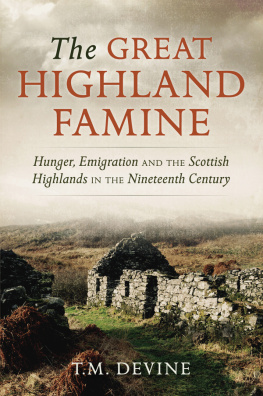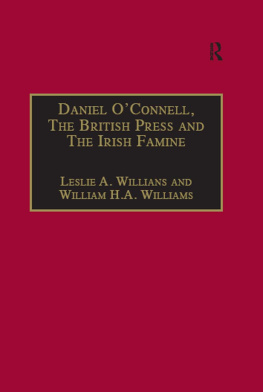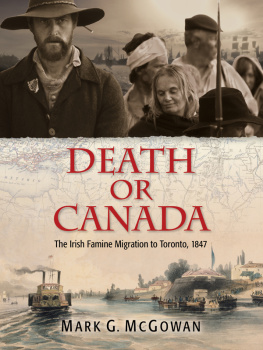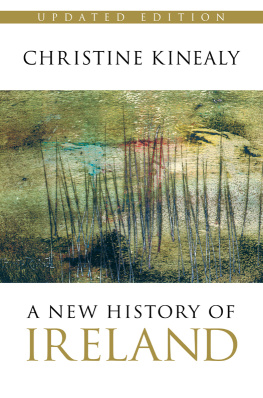A Death-Dealing Famine
A Death-Dealing Famine
The Great Hunger in Ireland
Christine Kinealy
First published 1997 by Pluto Press
345 Archway Road, London N6 5AA
Copyright Christine Kinealy 1997
The right of Christine Kinealy to be identified as the authors of this work has been asserted by her in accordance with the Copyright, Designs and Patents Act 1988.
British Library Cataloguing in Publication Data
A catalogue record for this book is available from the British Library
Library of Congress Cataloging in Publication Data
Kinealy, Christine.
A death-dealing famine: the great hunger
in Ireland/Christine Kinealy
p. cm.
Includes bibliographical references and index.
ISBN 9780745310756 Hardback
ISBN 9780745310749 Paperback
ISBN 9781783711215 PDF eBook
ISBN 9781783714056 Kindle eBook
ISBN 9781783714049 EPUB eBook
1. FaminesIrelandHistory19th century. 2. Ireland History18371901. I. Tide. II. Title: Gorta mr.
DA950.7.K56 1997
941.508dc21
9649017
CIP
Impression: 99 98 97 5 4 3 2
Designed and produced for Pluto Press by
Chase Production Services, Chadlington, OX7 3LN
Typeset from disk by Stanford DTP Services, Milton Keynes
Printed on Demand in the European Union by
CPI Antony Rowe, Eastbourne, UK
Contents
For Kieran, Siobhn and Arthur
Acknowledgements
The research and writing of this book has been made easier and more stimulating thanks to the support and encouragement of a number of people.
I am particularly grateful to Eileen Black, Sen Egan and Diana Newton for reading the text and offering valuable insights. Opinions, interpretations and mistakes are, however, my own.
Special mention is due to Don Mullan of Cait, whose knowledge and experience of contemporary famines has offered a special insight into Irelands Great Hunger. Thanks are owed also to Gary White Deer of the Choctaw Nation and Gabriel Byrne for their creative inspiration and their company and sensitivity during the annual AFRI Famine walk in Louisburgh.
I have benefited from discussions regarding the Famine with Patricia Brandwood, James Donnelly, Peter Gray, Patrick Hickey, Eamon Kirwan, Brian Lacey, Gerard MacAtasney, Frank Neal, Cormac Grda, Sean Sexton, Patrick OSullivan, Trevor Parkhill, David Sheehy and Roger van Zwanenberg.
The staff and archivists of the various record offices and libraries in Ireland, England and America have shown unfailing courtesy. The staff of the Maritime Archive in Liverpool and the National Library in Dublin deserve special mention.
Hugo Flinn kindly financed part of the research for this book. I am also grateful to the current Earl of Clarendon for permission to cite from the papers of his ancestor.
A number of close friends have played a valuable role in bullying, cajoling and encouraging me. They are Bernadette Barrington, Angela Farrell, Rita Rhodes, Rita Egan, Linda Christiansen and Val Smith. Additional support has come from John Archer, Cormac Behan, John Brandwood, Jenny Buelvas, Morag Egan, Laurie Feehan, Richie Gentry, Tina Hadlow, Bev Harrison, Jo Jones, Pat Jones, Geoffrey Keating, James Kelly, Noel Kissane, Stephen Lalor, Josie McCann, Chris Parker, Jean Parker, Ruth Peel, Christine Tant and Christine Yates.
My research has also brought me into contact with a number of of faminists in America and I have been encouraged and enthused by Angela Power, Owen Rodgers, Eileen Crimmins, Aine Grealy, David Burke, James Gallagher, Patrick Campbell, James Mullin, Charlie Laverty, Stuart Healy, Rita Mullan and Father Sean McManus.
To my family a special debt is owed: to my Irish grandparents who never had a chance to be buried in the country of their birth, and to my parents, Andrew and Mabel, who first taught me to love Ireland. Thanks also to Patricia, Bob, Jane, John, Margaret, Carol and Michael.
Finally, but most importantly, I wish to acknowledge my gratitude to those who have lived with me during the writing of this book. My beloved Wicklow collie, Trot, has been my constant companion, listened to all my concerns, and agreed with all my conclusions. Siobhn and Kieran continue to make everything worthwhile. And Arthur, as ever, for his encouragement, insights and Belfast wit.
CHAPTER 1
The Great Hunger in Ireland. Ideologies and Interpretations
The Irish Famine of 184552 was a defining event in the history of modern Ireland. Yet until recently it has been the subject of relatively little scholarly research, despite a rich resource of contemporary evidence. Documentary evidence relating to the Famine years is abundant and this has led some historians to identify a historiographical silence from the 1930s to the 1970s. It is only in recent years that researchers have started to access these sources and, as a consequence, more has been written to commemorate the 150th anniversary of the Great Famine than was written in the whole period since 1850. Despite this, the folk memory of the Famine and popular interest have remained strong.
The relative absence of academic research arose partly from ideological struggles concerning the nature and purpose of Irish historical research during the period from 1845 to the present. Even the designation of the Famine has been an area of debate. In popular understanding The Great Famine has become the most common sobriquet for the years of devastation and destruction in Ireland. Yet, The Great Hunger, The Great Starvation, The Bad Times, Gods Visitation, The Great Calamity, The Irish Holocaust and the Irish phrases An Gorta Mr, An Droch-Shaoghal and Bliain an Ghorta are all ways of describing the same event, and indicate differences of interpretation and emphasis. Canon ORourke, in his early account of the Famine published in 1874, noted that during the course of the Famine, relief committees and government officials avoided using the term famine, substituting instead distress, destitution, dearth of provisions, severe destitution, calamity, extreme misery, and so on.
The historiographical silence and the language of denial employed both during and after the Famine are remarkable in view of the scale of losses suffered by the Irish people during the Famine years. Between 1846 and 1851, at least one million people died out of a base population of over eight million people. To this can be added the high mortality amongst emigrants, which may have accounted for a further 100,000 deaths. Furthermore, many of the survivors of the Famine years experienced shortened lifespans as a consequence of successive years of privation. Overall, the high population losses make the Irish Famine one of the most lethal in modern world history.
In view of the enormity of the Famine and the significance of its legacy, the dearth of research until recently is even more surprising. Moreover, since the 1930s, and more overtly since the 1960s, scholarly research has been dominated by what is collectively referred to as a revisionist interpretation of Irish history. At its heart this reinterpretation of Irish history aimed at being totally research-driven, objective and value-free. In regard to the Famine though, revisionism explicitly set itself in contrast to a nationalist interpretation, which it viewed as politically inspired or judgemental, the antithesis of what the revisionists were trying to achieve.
From the 1930s to the 1980s, when the revisionist approach was in the ascendant, only two major books were produced on the Famine. Yet whilst little original research was carried out during this period, a number of influential orthodoxies emerged. These shaped scholarly research on the nineteenth century, in which the Famine was given no special significance. At the core of the revisionist view of the Famine lay three main assertions: first, that the Famine was not a watershed in modern Irish history but merely an accelerator of existing trends; second, that in view of Irelands large population and underdeveloped agricultural sector, a subsistence crisis was inevitable; and third, that, judged by the standards of the 1840s, the British government did all that reasonably could have been expected of it. Within this interpretation, suffering, mortality and blame were minimised, and the legacy of colonialism and the role of cultural stereotyping and racist attitudes were marginalised.

